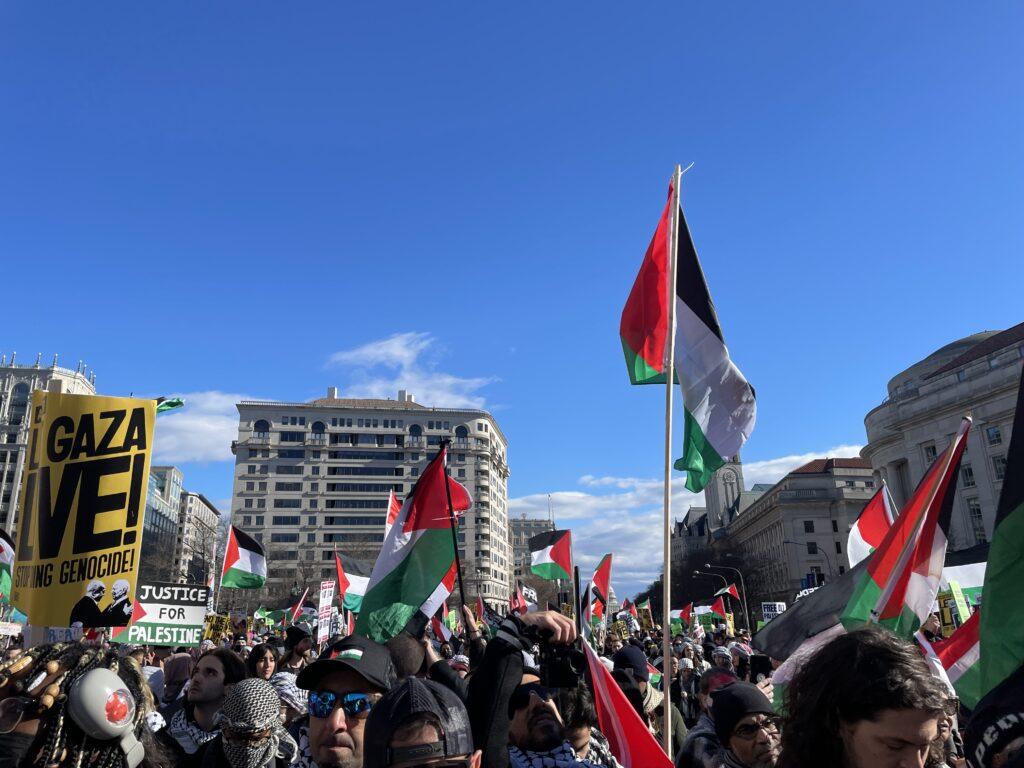Several Georgetown University students and faculty members joined the National March for Gaza in Freedom Plaza on Jan. 13, gathering alongside thousands of protestors calling for a permanent ceasefire in Gaza and an end to U.S. aid to Israel.
The Georgetown chapters of Students for Justice in Palestine (SJP), Faculty and Staff for Justice in Palestine (FSJP) and Zeytoun, an organization dedicated to decolonization in the Middle East and Northern Africa, helped organize groups of students and faculty to attend the march as part of the Georgetown Week of Action for Palestine, which commemorates 100 days of the war in Gaza. Speakers at the plaza called for a ceasefire and disarmament and told stories of injured and killed family members in Gaza.
After the rally, protesters marched around the White House.
Finley Heesch (CAS ’27) said she attended the march in support of a ceasefire in Gaza and to stand against the U.S. government’s response.
“I attended the National March on Washington for Gaza this weekend because I felt that there was a need to call for the United States to promote peace via a ceasefire in the midst of our government’s continued commitment to promoting violence and war in the Middle East,” Heesch wrote to The Hoya.
President Joe Biden planned to send $14.5 billion in aid to Israel, though the package has stalled in Congress due to debates over proposed aid for Ukraine. The Senate recently declined to pass a resolution calling for an investigation of Israel’s human rights record. Biden has quietly pushed the Israeli government to scale down the war, allow humanitarian aid and transition control of the Gaza Strip to Palestinian officials. The Biden administration still denied calls for a ceasefire.

The American Muslim Task Force for Palestine, an umbrella group of Muslim advocacy and human and civil rights organizations, and the ANSWER Coalition, an anti-war and civil rights organization, organized the march as part of a global day of protests. Around 400,000 people attended the protest, according to ANSWER.
ANSWER also helped to organize the previous Nov. 4 national march, which drew about 300,000 protesters, including a group of about 20 Georgetown students from SJP. Georgetown students also joined A National March for Israel at the National Mall on Nov. 14.
Heesch said the environment was positive, featuring speeches by activists and third-party presidential candidates Cornel West, a political activist and former professor, and Jill Stein, an activist and Green Party presidential candidate.
“It was a moving experience; everyone in the crowd was loving and supportive, and there were even many young children who attended the event. It was a powerful experience,” Heesch said.
Professor Nader Hashemi — the director of the Alwaleed bin Talal Center for Muslim-Christian Understanding, which studies the history of Muslim-Christian relations and promotes interfaith dialogue — said the march was a response to Israel’s continuing bombardment of Gaza and U.S. support for the war.
“The March for Gaza took place on the 100-day anniversary of the war against the backdrop of a U.S.-backed genocidal assault on the people of Gaza,” Hashemi told The Hoya. “The frustration and anger of the demonstrators toward this reality was palpable.”
Hamas killed 1,200 Israelis in its Oct. 7 attack, taking around 250 hostages, half of which remain in captivity. The Israeli response over the last 100 days has killed about 24,000 Palestinians in Gaza, along with numerous United Nations workers, journalists and health care workers. It is estimated that 45-56% of Gaza’s buildings are damaged or destroyed.
Hashemi added that the march signified broader support for a ceasefire and peace in Gaza and compared the march to anti-Vietnam War protests and the Civil Rights Movement, both of which Hashemi said criticized the American ruling class.
“This march was comprised of people from all walks of life,” Hashemi said. “It was mostly grassroots folks who came out to protest the U.S.-backed atrocities in Gaza and the absence of any democratic accountability over U.S. Mideast policy. In this sense, a clear message was sent that most Americans — unlike the ruling elites of the Democratic and GOP parties — support equal rights for all people in Israel and Palestine.”
Iklil Bouhmouch (GRD ’24) said she attended the march to stand up against human rights abuses and injustice.
“I have been attending protests for the liberation of the Palestinian people for many years, and I have done so because I believe it is our duty to stand up to injustice anywhere,” Bouhmouch wrote to The Hoya. “I choose to attend because I currently live in a country that chooses to fund ethnic cleansing instead of providing its people with quality education, healthcare, housing or even water,” Bouhmouch wrote to The Hoya.
Bouhmouch said in addition to the loss of life, there are also other global implications of the conflict on the climate and human rights
“Settler colonies have been used to test and develop harmful technologies and social structures,” Bouhmouch said. “We are directly implicated as American taxpayers, but also as global citizens. We should all be concerned about the loss of human lives, but also with the long term effects of Israeli carpet bombing on the climate.”
Hashemi said the movement for a ceasefire in Gaza is part of a larger movement for human rights, noting that there is a lot of potential for interfaith dialogue on the issue.
“The biggest opportunity I see is organizing a broad-based inclusive coalition of Muslims, Jews, Christians, atheists and others on the question of a just resolution of the Israel-Palestine conflict,” Hashemi said. “At its core, the struggle in Israel and Palestine is about universal human rights versus those who believe in the idea of an ethnoreligious-supremacist state.”




















